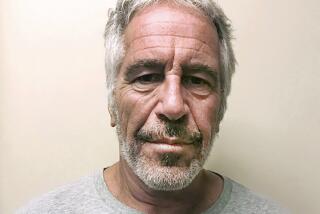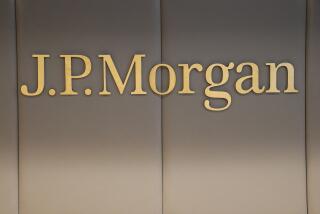Pimco Is Said to Be in Deal With SEC
- Share via
The Pimco mutual fund group will pay $50 million to settle civil charges by federal regulators, who claimed that it defrauded investors by letting a favored shareholder make improper “market timing” trades, a person with knowledge of the agreement said Friday.
But two former Pimco executives who were named in the case -- Stephen J. Treadway and Kenneth W. Corba -- plan to defend themselves and won’t be included in the settlement, according to their attorneys.
“We’re going to vigorously defend against the charges and go to trial,” said Alan Levine, Treadway’s attorney.
“We think the charges are unfounded,” said James C. Rehnquist, Corba’s attorney.
The deal, expected to be announced Monday, would end a probe by the Securities and Exchange Commission into two East Coast-based Pimco divisions -- PEA Capital, which manages the Pimco stock funds, and PA Distributors, which oversees retail mutual fund sales.
Both are sister units of Newport Beach-based Pacific Investment Management Co., the nation’s largest bond mutual fund company. All are owned by German insurance giant Allianz.
Under the deal, the $50 million in settlement money would be returned to Pimco fund shareholders, said the person familiar with the agreement, who spoke on condition of anonymity.
The settlement is separate from a deal reported by The Times last week, in which the Pimco group would pay at least $10 million to $12 million to settle charges that it sent trading business to brokerages that pushed the firm’s stock funds to investors. That agreement is expected to be finalized soon, sources say.
A Pimco spokesman declined to comment. The SEC also declined to comment.
The SEC’s case accuses Pimco, Treadway and Corba of allowing a hedge fund, Canary Capital Partners, to engage in market timing from February 2002 to April 2003. Market timing is a rapid, in-and-out trading of shares that is not illegal by itself but can harm regular investors by driving up trading costs shared by all.
Pimco also gave Canary access to nonpublic information about its holdings, the SEC said. Such disclosure can hurt fund investors by allowing traders to unfairly piggyback on the fund’s proprietary stock research. It can also help traders “short,” or bet against, stocks held in the portfolio.
Treadway, former chief executive of PA Distributors in Stamford, Conn., allegedly approved the market-timing agreement in January 2002 but did not disclose his knowledge of it to other Pimco executives until September 2003.
Corba, former CEO of PEA Capital in New York, negotiated and approved the timing arrangement, the SEC claimed. He also managed a fund that received a long-term investment made by Canary in exchange for the right to time, regulators said.
If Treadway and Corba go to trial, it would mark the first time in the year-old mutual fund scandal that fund executives forced the SEC to prove its claims in court instead of agreeing to a settlement.
A federal judge in New York on Friday approved a schedule for pretrial discovery in the case, said Levine, Treadway’s attorney. He said a trial could begin next year.
Randall R. Lee, head of the SEC’s Los Angeles office -- which led the probe into market timing at Pimco funds -- said the agency had no intention of backing down. “We believe the charges are fully supported by the evidence, and we are looking forward to presenting that evidence at trial,” he said.
Pimco’s settlement would be another in a string of such deals since New York Atty. Gen. Eliot Spitzer revealed widespread trading abuses in the $7.4-trillion fund industry.
In addition to the inquiry into market timing, the SEC and California Atty. Gen. Bill Lockyer have been looking into whether Pimco improperly sent stock-trading business to brokerages that pushed sales of Pimco stock funds.
The SEC is probing these so-called revenue-sharing practices at more than a dozen fund companies, including Los Angeles-based Capital Group, which runs the American Funds. Critics say such agreements between funds and brokers, which usually involve either cash payments or stock trading business, created conflicts of interest that could have hurt individual investors.
If Pimco settles the revenue-sharing probe, it would be just the second such deal reached between regulators and a fund company. The first was with Massachusetts Financial Services Co., parent of the MFS Funds, which agreed in February to pay $50 million.
More to Read
Inside the business of entertainment
The Wide Shot brings you news, analysis and insights on everything from streaming wars to production — and what it all means for the future.
You may occasionally receive promotional content from the Los Angeles Times.










